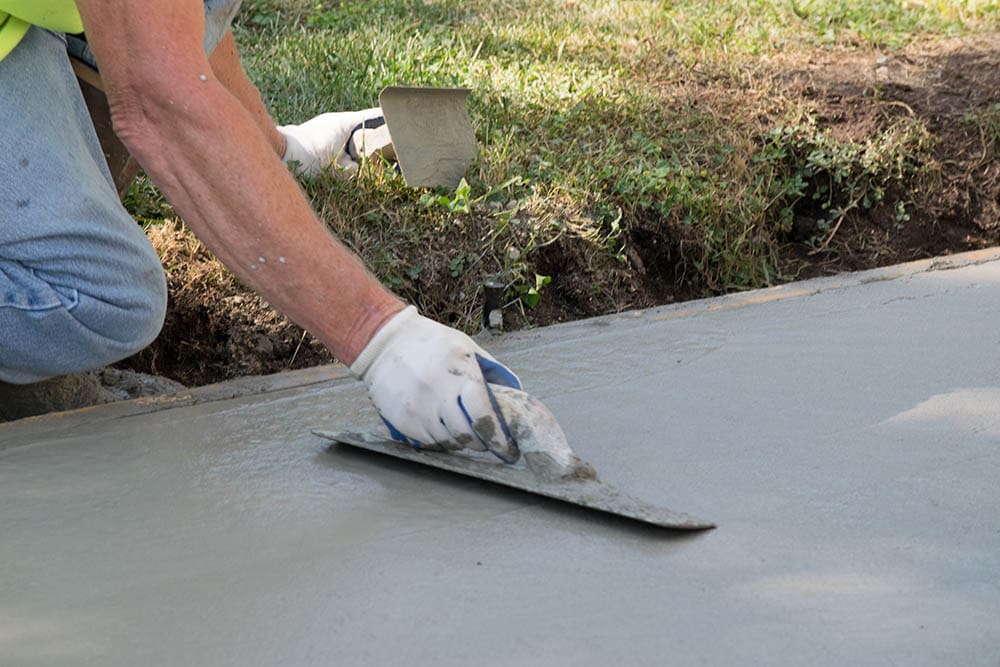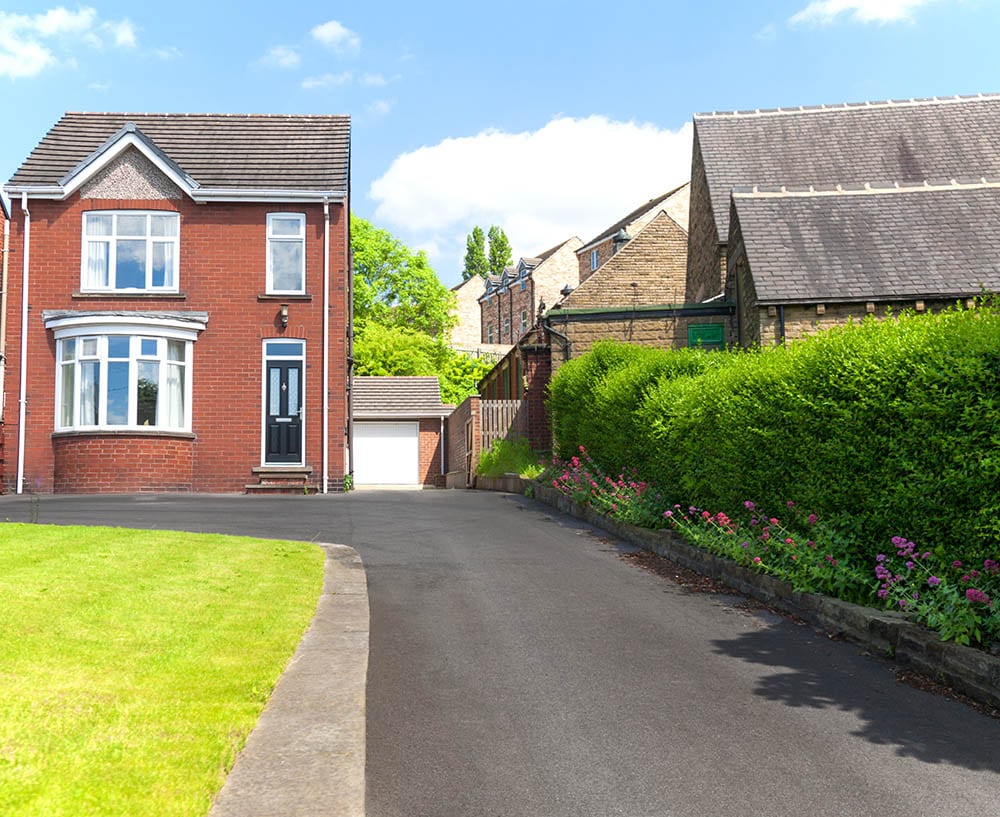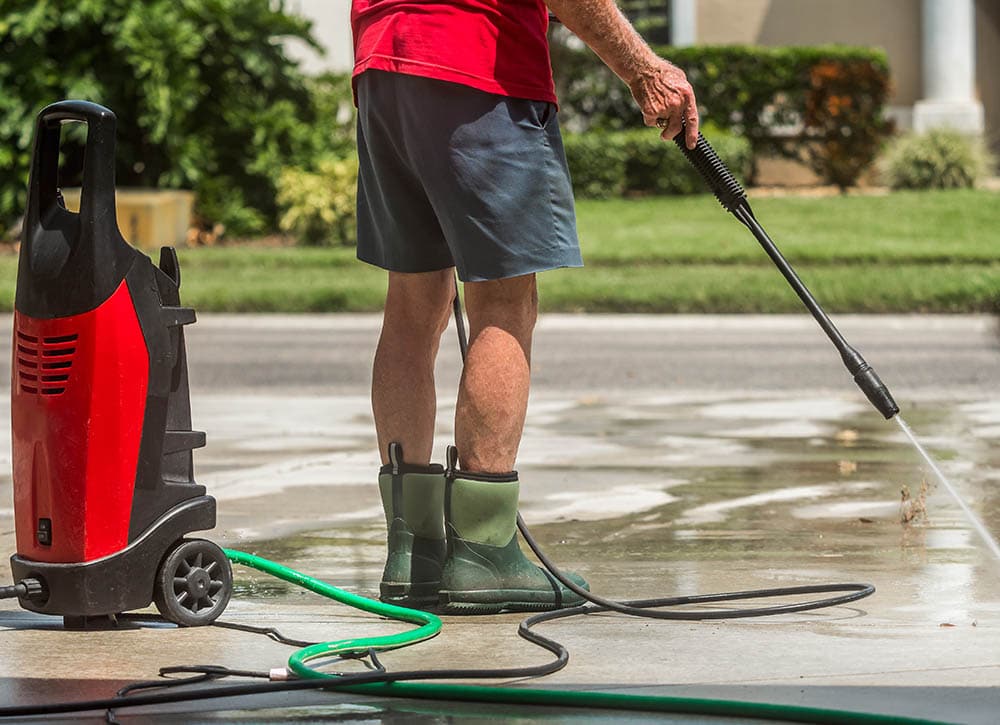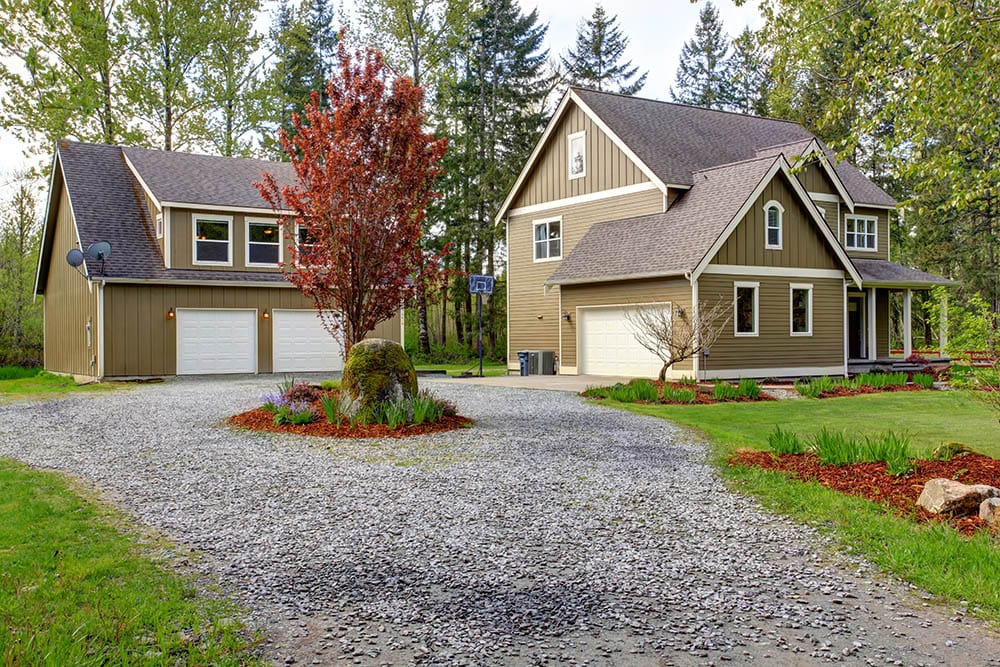What is Sealcoating? Pros, Cons, Types, & FAQ
-
Pete Ortiz
- Last updated:

Attractive and durable, asphalt is the go-to material if you want a sturdy yet affordable alternative to a concrete driveway. But at roughly $3–$7 per square foot, even the tiniest driveway can set you back a few hundred dollars. For what you pay, it’s crucial to make it last as long as possible.
That brings us to asphalt’s one essential weakness: natural longevity. Asphalt can last over 20 years, but, unlike concrete, it needs regular maintenance to live a long and healthy life. You will need to seal your asphalt driveway once every few years to create a protective membrane.
Sealcoating is a non-negotiable task for an asphalt driveway, so it’s critical to know when it needs it and how it works. We’ll break down the basics of sealcoating to help you keep your driveway in pristine condition for decades.
 How Does Sealcoating Work?
How Does Sealcoating Work?
Asphalt is an oil-based binder that glues aggregate, such as stone, gravel, slag, and sand, together to form a smooth finish. Out in the elements, it faces constant abuse from UV rays, rain, ice, wind, oil, and chemicals. As these factors impact and dig into the driveway, the asphalt fades, degrades, and becomes brittle. Cracks form to allow even more water, oxygen, and chemicals in, expediting the wear and creating an unusable, unsafe surface.
Sealcoating provides a slip-resistant layer that blocks damaging agents while creating an attractive dark black surface. The application is generally easy enough for the average DIYer. You can put it on with large brushes, squeegees, or sprayers, essentially painting the driveway with sealant.
Proper and timely application is crucial to ensure your driveway has adequate protection. The application schedule will depend on your climate, exposure level, and the type of sealcoating you are using for your asphalt.

What are the Different Types of Sealcoating?
A sealant consists of a liquid formula mixed with water and aggregate filler like sand and silica. Generally, more hard material in the sealcoating means it’s sturdier and more stable. Manufacturers also include various polymers and other additives to speed up dry time, increase flexibility, and improve damage resistance.
The liquid formula in the sealcoating is the primary differentiator between products. There are four types of sealants you will find today: coal tar, asphalt emulsion, acrylic, and fast-dry.
Coal Tar
Coal is baked at high temperatures to create coke, a porous solid composed almost entirely of hydrocarbons. It’s essential in the production of steel and certain types of fuel. A byproduct of the coking process is coal tar, a viscous liquid. Coal tar sealcoating consists of coal tar and 20–35% coal tar pitch, a black liquid byproduct of distilling coal tar.
Coal tar sealcoating is one of the most effective protective barriers against chemical and oil spills, UV rays, and weather. It lasts longer than asphalt emulsion and is relatively inexpensive. Nonetheless, coal tar is losing popularity and becoming unavailable in many areas because of its toxic properties.
Professionals must install coal tar because of the health risks of inhaling or otherwise coming into contact with the potent fumes. The risks stem from the high concentration of polycyclic aromatic hydrocarbons (PAHs). These can be up to 1,000 times higher than PAH levels in asphalt emulsion products.
Many PAHs are known carcinogens and environmental hazards. Occupational PAH exposure increases the chance of developing skin, lung, kidney, and bladder cancers. Meanwhile, stormwater runoff from coal tar driveways contributes to a substantial sediment buildup in water supplies like lakes and streams, adversely affecting fish and wildlife.
To address the concern, many municipalities and states, including Washington, Minnesota, and Washington, D.C., have placed limitations or outright bans on coal tar sealant sales. Home Depot and Lowes have also discontinued coal tar sealcoating in their stores.

Asphalt Emulsion
Asphalt emulsion sealcoating is sometimes referred to as bitumen-based sealcoating. Bitumen, which comes from crude oil distillation, is the liquid binding agent in asphalt, making it sensible to use for sealcoating. Water, bitumen, and a hint of soap (the emulsifier) combine to create the asphalt emulsion, while polymers and other chemical additives add to its strength and weather resistance. The solution then combines with various aggregates to create a powerful adhesive bond.
There are several benefits to using asphalt emulsion, particularly its safety. Compared to coal tar sealcoating, asphalt emulsion sealants emit fewer VOCs and odors. They are more environmentally friendly, less hazardous to your health, and easier to apply.
An asphalt emulsion sealcoating offers an attractive look alongside excellent water resistance, flexibility, and adhesion. The main drawback is the chemical and UV resistance. Newer additives and asphalt emulsion products enhance durability, but the real problem is the petroleum-based binder. Unlike coal tar sealants, asphalt emulsion can dissolve and soften from gas and oil spills, making it prone to wear.
Acrylic
Acrylic sealcoating is a pricey choice, but the payoff is big in durability and low toxicity. The synthetic sealant has a similarly high resistance to UV rays, oil and fuel spills, and moisture as coal tar. The application emits few VOCs and is much safer for humans, and it doesn’t present the same environmental risks as coal tar and asphalt emulsion sealcoating.
Although it’s more expensive than other sealcoating options, acrylic can last up to 7 years. You can also purchase it in broad assortments of colors to give your asphalt driveway a bold aesthetic.

Fast-Drying
Fast-drying sealers are less common for residential driveways due to the high cost and low commercial availability. Offering the same benefits as standard sealants but drying in less than an hour, it’s a popular choice for crews working on heavily used roads and parking lots.
When Is Sealcoating Used?
Every asphalt driveway needs sealcoating 6–12 months after installing it and once every 2–5 years after that. The time frame varies greatly depending on the type of sealcoating. Asphalt emulsion sealants may only last a season or two, while acrylic can last over seven years in ideal conditions. Checking product warranties is often the best way to get an accurate idea of a sealant’s longevity.
You need to apply sealcoating when temperatures are consistently over 55°F, so the months of May—September are generally ideal no matter what kind you use. It requires 24–48 hours to cure, and you can’t put it down when there is a chance of rain before it finishes drying.
- Protects against rain, ice, and snow
- Maintains an attractive dark black aesthetic
- Can double the life of your driveway by resisting breakdown
- Resists salt damage, chemical or oil spills, and oxidation from UV rays
- Certain types of sealcoating products are easy to apply and fast-drying
- Creates a smooth, easy-to-clean surface
- Reduces maintenance costs
- Improves asphalt driveway flexibility and skid resistance
- Requires regular maintenance
- Cannot be used on new asphalt
- Does not fix severe asphalt damage
FAQs: Driveway Sealcoating
Is Sealcoating a Driveway Worth It?
Sealcoating can drastically extend the life of your asphalt driveway, doubling it in most cases. Let’s break down the options: sealing your driveway every 2–5 years or leaving it unsealed.
Let your driveway sit unsealed, and it could last you 10 years or more in ideal conditions. On the other hand, if you live in a colder climate or see heavy weather in your area, it may start opening cracks within a single season. If you have a 300-square-foot single-car driveway, a replacement will cost $600–$900 on the low end, and that’s before you factor in the $5–$7 per square foot for labor.
Materials will only cost $25–$100 to seal that 300-square-foot asphalt driveway. You can apply it yourself to save on labor costs, and many of the lower-priced options still come with 5-year warranties or better. So, you can do zero maintenance and spend $600 in 10 years (if you’re lucky) for a new asphalt driveway, or you could spend $200 total and a few hours of your time to make the driveway last 20–30 years.
Does Sealcoating Repair Cracks?
Sealcoating typically does not repair cracks. There is some preparation you need to do before sealcoating your driveway. You generally need to trim back vegetation, sweep the driveway surface clean of dirt and debris, and fill any major cracks before sealcoating. Nowadays, there are many “filler/sealer” combinations that you can buy to repair minor imperfections and seal your driveway at one time.
What Is the Difference Between Asphalt and Concrete?
Asphalt is similar to concrete in that it consists of ground rocks and sand. The difference is in the binder. While concrete utilizes cement as the glue for the hard material, asphalt is a petroleum-based, tar-like substance that is super-heated to transform it into a liquid. For that reason, some people call it “hot mix asphalt” or simply “hot mix”.
Installers have to work fast in laying, leveling, and grading the asphalt before it cools and hardens. The edges aren’t as perfect as concrete driveways, the perceived value may be lower, and it doesn’t last as long. But asphalt is still much cheaper, easier to seal, less likely to crack, and hardier in cold, icy weather. Heat can cause it to warp and degrade, so asphalt is not ideal in warmer southern climates.
- Related Read: Asphalt vs Concrete Driveway: Pros, Cons & Verdict

Do You Need to Sealcoat Concrete?
Sealing concrete has its benefits, and there are numerous concrete-specific surface and penetrating sealers to fill cracks, prevent fading, and reinforce its strength. It can improve the look and possibly add a few years to your driveway’s life.
Sealing can be practical in colder climates to prevent ice and freeze-thaw damage. Still, unlike asphalt, concrete does not typically need regular sealing to get several solid years of use out of it.
 Conclusion
Conclusion
Sealcoating every few years is crucial if you want your asphalt driveway to last 20 years or more. When you forgo sealcoating, your driveway can quickly become cracked, faded, and unusable in only a few years.
The investment is nominal, and with constant upgrades in their designs, sealants are becoming cheaper, longer-lasting, and easier to use. With sealcoating, it’s simple to maximize your driveway’s curb appeal and save yourself hundreds of dollars in the long run.
Featured Image Credit: Stacy Ellen, Shutterstock
Contents

 How Does Sealcoating Work?
How Does Sealcoating Work?